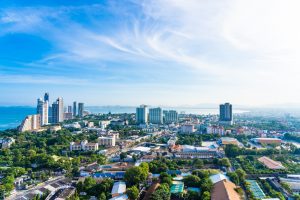A true story of how a young man from Sarawak came to Kuala Lumpur for a better life, got buried in debt and is looking for a way out.
19 February 2004. It was a proud date for my family. It was the date on the flight ticket for me, Aliff*, the eldest son in my family, to leave Bintulu, Sarawak to move to the big city, Kuala Lumpur.
Then 26 years old, I’d gotten a job as an auxiliary policeman (Polis Bantuan) in KL, where I’d be stationed at an important government building. Getting this job in Semenanjung, as we Sarawakians call Peninsular Malaysia, was a big deal — I wouldn’t just be making a better life for myself. I’d also be sending money back home to my single mother, who raised me and my siblings all by herself.
As a Polis Bantuan, I’d also be classified as a civil servant. I felt proud that I could work for the government and like many other Malaysians, still believe the government is a respected place to work. Little did I know that people sometimes take advantage of civil servants because of the steady salary we get…
It’s now May 2021 and I’m turning 44 years old. I knew that moving to Semenanjung would change my life, but I didn’t think my life would get worse.
*Name has been changed.
Financing my new life
I started work right away when I reached KL, even before having a permanent place to stay and my own transport to get around. So, I needed to find a home and buy a motorbike. While looking for somewhere to live, I got a short term rental of 2 weeks before I found a permanent place. That gave me 2 weeks to find a home!
When I was looking for a place to stay, I didn’t realise the main thing you need when renting: the deposit. I had no idea you needed to pay at least 2.5 months of rent as a security and utility deposit.
I started to stress out. My hope of a better life was getting smaller before it even began. The little money I’d brought from Bintulu was already running out. There was no way I could borrow that much money for the deposit from my family or friends.
The next difficult thing I came across was getting a motorbike. I’d planned to get a loan which I’d pay off every month using the salary from my new job. But I needed to show the bank 3 months of pay slips, which I didn’t have yet. So, my loan application was rejected.
On my third day of work, I spoke to my workmate about my problems. We’d become friends quickly because he was from Sarawak, too. He told me not to worry.
Since we were government employees who weren’t expected to ever lose our jobs, we could get loans from a credit cooperative which would be approved easily. The monthly repayments would be taken straight from our salary, guaranteeing the cooperative that the loans would be paid every month, as long as we kept our jobs.
Why I started taking loans
So, right after I started working, I took my first loan of RM5,000 from a credit cooperative. The loan period was 2 years. I’d be repaying RM245 a month.
I didn’t know much about loans and debt back then. All I thought was with RM5,000 in my pocket, I could buy a motorbike for RM2,500, pay my rental deposit of RM1,000, and still have some balance left over. With my RM1,300 salary, I didn’t think paying RM245 every month for the loan was a big deal.
For 3 years I rented the same room and rode the same bike. I was then making RM1,700. But, I wasn’t keeping track of my spending. I also ended up taking on more loans to pay for bike repairs and some other spending. So, sometimes I didn’t have enough money to repay my loans at the end of the month.
How my debt grew
Every day at the place I worked, there would be banking agents offering loans to my colleagues and I. It was always the same story: big amounts, easily approved, not much documentation needed. All because we were civil servants who everyone thought would keep our jobs forever.
I always turned down the loans because I didn’t think I needed the money. But then, my mother got sick and needed heart surgery. She didn’t have insurance and needed my help to pay for her treatment, which was going to cost RM20,000. So, I finally decided to take a loan from the agents who were always hanging around my workplace.
At first, I thought I’d take a RM30,000 loan. I planned to use it to pay for my mother’s surgery. I was also going to use the balance to pay the bank fees, my cooperative loans, and other loans that I had. Then, I’d just have one loan to repay every month.
So, when I talked to one of the bank agents, he said I’d have to take a loan of at least RM134,000 to pay off all my existing loans that I have and still get at least RM25,000 in hand.
I didn’t wonder why I’d only get that much money from such a big loan. I was actually more worried my loan wouldn’t be approved. After all, I only earned RM1,700 at the time.
So, by the time the agent called me a few weeks later to tell me my loan was approved, all I could think about was that I’d have enough to pay for my mother’s surgery, my other expenses and still have some money left over. It only occured to me much later, with monthly repayments of RM1,000 towards the new loan, it would be tough for me to live on the balance of RM700.
Why I stopped paying my loans
A week after I got my loan, I took leave from work and got on a flight back to Bintulu to help take care of my mother. I was proud to be able to pay for her surgery.
But, my mother didn’t get better. After her surgery, she had a stroke and couldn’t walk anymore. I had to take more time off work, until I ended up using all my annual leave. Since I needed to stay in Bintulu to take care of my mother, my boss advised that the best thing for me to do would be to quit my job.
Without a job, I couldn’t pay for my loan anymore. I thought I had problems before, when I didn’t have enough money to pay for my rental deposit, motorbike and later my mother’s surgery. But when I stopped repaying my loan, that’s when my real problems started…
Want to know what happens next? Stay tuned for part 2 of Aliff’s story coming on 31 May 2021!
What do you need to know if you’re just starting out in your first job or moving to a new city?
- When looking to rent a place, always remember initial security deposits
When you look for a place to rent, you’ll usually have to pay a 2-month security deposit and a half month’s utilities deposit. So make sure you’ve saved some money before leaving home. You can use this money when you’ve moved to your new city. If you can’t afford it yet, try to stay with a friend or someone you know.
If you’d like to learn more about renting vs buying a home, read our blog.
- Only take on loans you can afford to repay
A good way to take care of your spending is to create a budget to help you understand what your monthly expenses are. Then you’ll know how much you can afford for monthly debt repayments. A good indication is to make sure your monthly repayments are below 40% of your income. Apart from that, always compare a few loans to see which bank charges the lowest fees and lowest interest rate when you take a loan.
- Keep track of your debt
Taking on too much debt will make it difficult for you to keep up with your monthly repayments. If you don’t pay off your loan, the interest on your loan will continue to grow and the total you owe will keep getting bigger. For example, a RM1,000 ringgit loan with a reducing balance interest rate of 18% will grow to RM1,196 after 1 year. By the end of year 4, the amount would have grown to RM2,043. Apart from that, if you’re late or stop repaying your loans, your credit score will go down, or worse, you could end up being declared bankrupt.
- Take an insurance policy
You can’t plan medical expenses. So, protect your family and yourself by taking insurance to help pay for unexpected medical bills. Having insurance can also help you avoid needing to take loans to pay for medical bills. To help people in the B40 category, the government has come up with insurance schemes such as Perlindungan Tenang and MySalam. Click here to see if you’re eligible for these schemes.
- Aim to build emergency savings
One of the first things you should do when you start getting an income is to put aside some money for emergencies. You can start small, but the important thing is to save regularly so you can build enough savings to cover emergencies, like if you lose your job.



